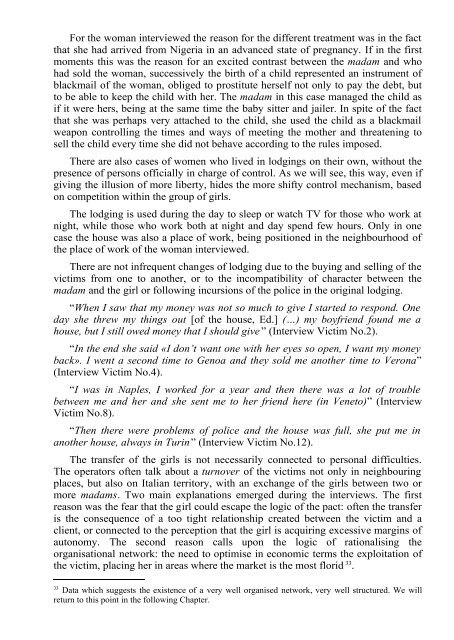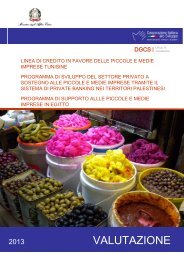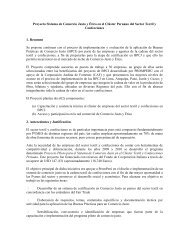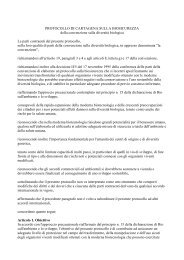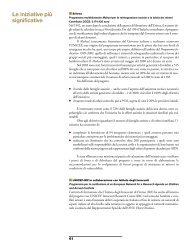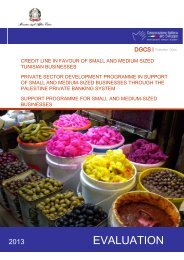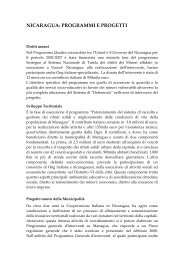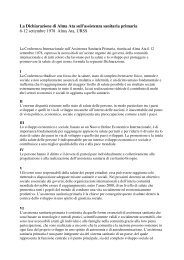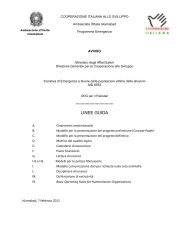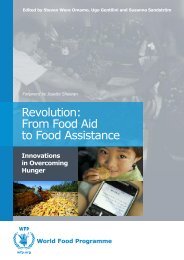have no shop and then t<strong>here</strong> is no possibility to work <strong>here</strong>, you won’t earnanything, and then they will not take you, you have to join the girls to work on thestreet. «What!?!» «Oh yes dear, this is the work that we do <strong>here</strong>»” (InterviewVictim No.3).The women are instructed on how to behave with the clients and accompaniedto the position by the madam or by the other girls. The madam shows them thebank notes and explains the value of each one. She recommends acceptingexclusively Italian clients, avoiding Albanians and Moroccans, considered to be toodangerous. She gives a glove, handkerchiefs and prophylactics, she makes the girldress with “work dresses” and she sends her together with the others, that have thejob of teaching the work, on the street.“At night she came to show me «This is 5 Euros, this is 10...» and she hadbought me clothes. But it was cold and I asked «how is it possible that I put onthese small clothes?»” (Interview Victim No.12).“They gave me a glove, they gave me handkerchiefs, they gave me a miniskirt toput on, they gave me boots because I was cold ” (Interview Victim No.2).The first period is recalled as the worst: many women tell how they cried fordays, even at work, not even managing to get one client. This behaviour makestheir position worse and, once returning to the house without money they arethreatened and hit.This phase overcome t<strong>here</strong> begins a tight rhythm of work, which finds manywomen engaged day and night for the complete restitution of the debt.Living and working conditionsThe majority of the women live heaped up in small lodgings or grouped in oneroom.“In the house I lived in we were 13, with me 14. In one room.” (InterviewVictim No.10).“It was a mini-apartment, room and kitchen and t<strong>here</strong> were two beds in thekitchen” (Interview Victim No. 8).“I was in the house with 7 girls, two rooms and a kitchen. Including her (themadam) we were 8, when I arrived 9” (Interview victim No.5).T<strong>here</strong> are also cases in which the victim lives alone with the madam and hercompanion or her husband. This is in cases in which the madam is at her firstexperience, so she has not yet enough money to buy many girls or lodging,sometimes in another city, in which the so-called controller can manage on herbehalf, a group of women. In this case the choice is that keeping one woman withher may depend on the necessity for greater control of the victim in question, orother reasons of a practical nature.“She did not have girls in the house, t<strong>here</strong> was only me and they gave me aroom w<strong>here</strong> t<strong>here</strong> was only a bed. On the Castilian however t<strong>here</strong> was a very bighouse, 4 rooms and t<strong>here</strong> lived 15 girls ” (Interview Victim No.5).
For the woman interviewed the reason for the different treatment was in the factthat she had arrived from Nigeria in an advanced state of pregnancy. If in the firstmoments this was the reason for an excited contrast between the madam and whohad sold the woman, successively the birth of a child represented an instrument ofblackmail of the woman, obliged to prostitute herself not only to pay the debt, butto be able to keep the child with her. The madam in this case managed the child asif it were hers, being at the same time the baby sitter and jailer. In spite of the factthat she was perhaps very attached to the child, she used the child as a blackmailweapon controlling the times and ways of meeting the mother and threatening tosell the child every time she did not behave according to the rules imposed.T<strong>here</strong> are also cases of women who lived in lodgings on their own, without thepresence of persons officially in charge of control. As we will see, this way, even ifgiving the illusion of more liberty, hides the more shifty control mechanism, basedon competition within the group of girls.The lodging is used during the day to sleep or watch TV for those who work atnight, while those who work both at night and day spend few hours. Only in onecase the house was also a place of work, being positioned in the neighbourhood ofthe place of work of the woman interviewed.T<strong>here</strong> are not infrequent changes of lodging due to the buying and selling of thevictims from one to another, or to the incompatibility of character between themadam and the girl or following incursions of the police in the original lodging.“When I saw that my money was not so much to give I started to respond. Oneday she threw my things out [of the house, Ed.] (…) my boyfriend found me ahouse, but I still owed money that I should give ” (Interview Victim No.2).“In the end she said «I don’t want one with her eyes so open, I want my moneyback». I went a second time to Genoa and they sold me another time to Verona”(Interview Victim No.4).“I was in Naples, I worked for a year and then t<strong>here</strong> was a lot of troublebetween me and her and she sent me to her friend <strong>here</strong> (in Veneto)” (InterviewVictim No.8).“Then t<strong>here</strong> were problems of police and the house was full, she put me inanother house, always in Turin” (Interview Victim No.12).The transfer of the girls is not necessarily connected to personal difficulties.The operators often talk about a turnover of the victims not only in neighbouringplaces, but also on Italian territory, with an exchange of the girls between two ormore madams. Two main explanations emerged during the interviews. The firstreason was the fear that the girl could escape the logic of the pact: often the transferis the consequence of a too tight relationship created between the victim and aclient, or connected to the perception that the girl is acquiring excessive margins ofautonomy. The second reason calls upon the logic of rationalising theorganisational network: the need to optimise in economic terms the exploitation ofthe victim, placing her in areas w<strong>here</strong> the market is the most florid 33 .33Data which suggests the existence of a very well organised network, very well structured. We willreturn to this point in the following Chapter.
- Page 1:
TRAFFICKINGOF NIGERIAN GIRLSTO ITAL
- Page 5 and 6:
F O R E W O R D1. Objectives and st
- Page 7 and 8:
and who have identified the most si
- Page 9 and 10:
on the other hand, for those involv
- Page 11:
Case files analysed: Preventive det
- Page 15 and 16:
Table 2 - Socio-economic situation
- Page 17 and 18:
Table 3 - Nigerian citizens regular
- Page 19 and 20:
Table 5 - Social protection permiss
- Page 21 and 22:
Table 7 - Number of persons charged
- Page 23 and 24: Table 8 - Detainee population sub-d
- Page 25 and 26: and the United States enables this
- Page 27 and 28: C H A P T E R IW a y s a n d p h a
- Page 29 and 30: Figure No.2 - Edo State.It is not c
- Page 31 and 32: Nigeria. From 1996 in Benin City an
- Page 33 and 34: In this variegated framework, the d
- Page 36: “Benin City is one of those State
- Page 39 and 40: Various privileged witnesses of the
- Page 41 and 42: In the first years of the traffic o
- Page 43 and 44: pay considerable sums for lodging,
- Page 45 and 46: The routesWe find at least three ty
- Page 47 and 48: Figure No.5 - Trafficking routes th
- Page 49 and 50: The journey overland through Africa
- Page 51 and 52: new dispositions and contacts to co
- Page 53 and 54: Then he sends her in a taxi to the
- Page 55 and 56: T. remains in this house for 21 day
- Page 57 and 58: detainees go towards the refectory,
- Page 59 and 60: At this point the organisation esco
- Page 61 and 62: was accepted by the Ivory Coast pol
- Page 63 and 64: B.E. «Yes, I was given a Ghanaian
- Page 65 and 66: Now the documents are “hired”:
- Page 67 and 68: It is understood however that the v
- Page 69 and 70: “There is no Nigerian passport wh
- Page 72 and 73: C H A P T E R I VL i v i n g a n d
- Page 76 and 77: The cost to manage the house and th
- Page 78 and 79: mine since a long time, he can’t
- Page 80 and 81: A feminine managementIn analysing t
- Page 82 and 83: “There are many pimps that when y
- Page 84 and 85: The control of movementThe fact tha
- Page 86 and 87: Physical punishments can be made by
- Page 88 and 89: Control between psychological subje
- Page 90 and 91: arms), tortured in many different f
- Page 92 and 93: C H A P T E R VT h e o r g a n i s
- Page 94 and 95: Each penal procedure on the subject
- Page 96 and 97: Often it is the same madam who move
- Page 98 and 99: Even in numerous recent criminal pr
- Page 100 and 101: work arrangements (…) persons tha
- Page 102 and 103: man all the money she had in the ho
- Page 104 and 105: in the plates and everything and th
- Page 106 and 107: exploitation) has reached an amount
- Page 108 and 109: C H A P T E R V IT h e e n d o f t
- Page 110 and 111: A: «You have to bring me a present
- Page 112 and 113: Often the family is however not abl
- Page 114 and 115: the different evaluations of the as
- Page 116 and 117: The discussions on the possibility
- Page 118 and 119: eal results: to distance herself fr
- Page 120 and 121: of a different culture is very impo
- Page 122 and 123: C H A P T E R V I IC o n s i d e r
- Page 124 and 125:
In the case of the girls having mor
- Page 126 and 127:
As has been many times noted, the c
- Page 128 and 129:
under the profile of the “quality
- Page 130 and 131:
person to obtain either relevant re
- Page 132 and 133:
Numerous are the criminal juridical
- Page 134 and 135:
If the accused claims to not knowin
- Page 136 and 137:
sanctions, sometimes, also in prese
- Page 138 and 139:
d) Investigative and judiciary co-o
- Page 140 and 141:
The reform foresees, under Art. 1,
- Page 142 and 143:
which the woman can definitively tu
- Page 144 and 145:
witnesses, social operators - agree
- Page 146:
and necessary, therefore, to think
- Page 149 and 150:
in many cases they are driven to th
- Page 151 and 152:
Melossi, D., (2002), “Le teorie s


